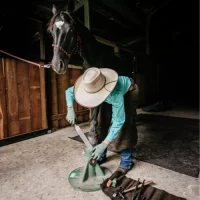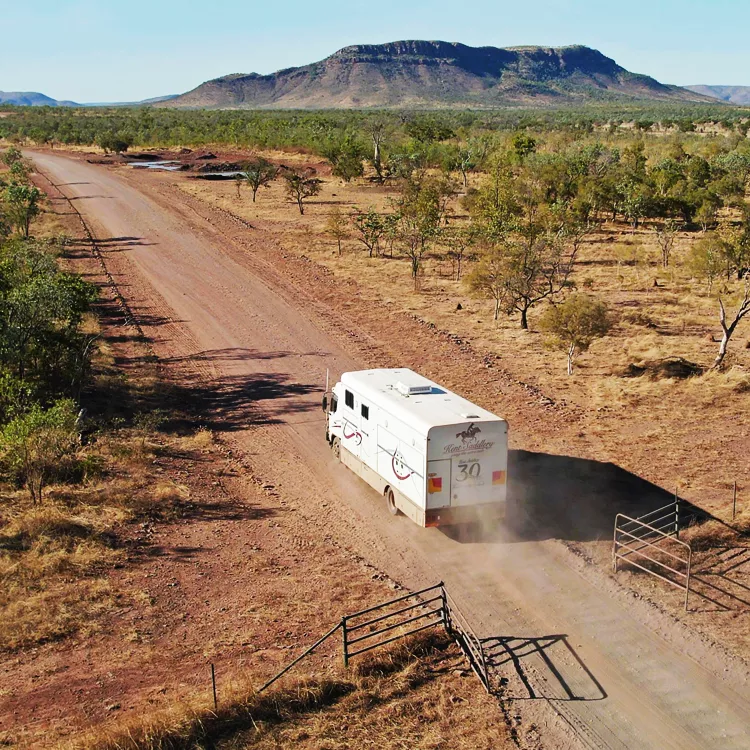Norm Rowland
Waterloo Station
When Norm Rowland was approached by Dougal Brett of Waterloo Station, to take up the position of grader driver, Norm already knew Waterloo country like the back of his hand.
In 2005, he began the work of opening up the goat tracks on the station, driving the grader past places where, in the 1970’s, he worked in a team of sixteen men, mainly Indigenous stockmen, broncoing, tailing out, and using up to sixteen pack horses.
Norm was born in Boulia QLD; his childhood interspersed with a variety of experiences and places. His Dad worked on, and managed stations, where the young Norm learned early the stock handling skills which would become a big part of his life. When Norm was seven years of age, his parents managed the Hamilton Channels Hotel, between Boulia and Winton, and Norm got to know the ringers, roo shooters and swaggies who came to the hotel. “The swaggies cut wood for Mum in exchange for a meal,” and the industrious young Norm would collect cigarette butts, gradually filling old cigarette tins with tobacco…… a very saleable item!
In his teens, Norm was one of twenty-seven workers who were part of an LJ Hooker incentive to supply workers to different stations up North. Norm started at Ivanhoe Station, WA, and also spent time at Legune Station NT, as part of the scheme. His original connection with Waterloo Station began in 1972, when he was working at Auvergne Station NT. Like most of the ringers from surrounding stations, he eagerly headed for a major social event, the Timber Creek races, and during the course of the weekend, “the Waterloo mob talked me into coming here.” Norm soon settled into the job of horse breaking at the station. “Thirty horses the first year, and forty-seven the next.” Bob Napier, or “Nape,” was the manager of Waterloo, and over the next ten years, Norm alternated between horse breaking, and filling in for injured head stockmen. He laughs, “must’ve been something about me and injured head stockmen.”
Norm remembers the first helicopter muster on Waterloo in 1974, at Gum Creek. At a time when helicopters were first being used for mustering, “Bob Napier was adamant that he would never use choppers for mustering.” One day, out at stock camp, an enthusiastic and persuasive chopper pilot landed near the yards, and “he wheeled Nape! We did one muster with the chopper, and it worked out that well, old Nape was wrapped!”
Norm’s height and weight might have changed a bit over the years; …… back then he was five feet high, and seven stone, and the owners of Roxmere Station had a mob of race horses. Norm seemed to be an obvious candidate to ride these horses, and he became a registered apprentice jockey. He was a talented rider, and earned the title of leading jockey in Western Australia for two years. At Waterloo, he would work until the end of the season, then go to Sydney to ride the race horses. However, Norm reflects that “it wasn’t much of a life, and after a bad fall I gave racing away.” He returned to full time ringing, but in 1988, when he was overseer at Argyle Downs Station NT, another serious fall from a horse convinced him “it was time to give the horses away.”
He transferred his skills from riding to driving, and learned a lot about grader driving from George Johnson. He then spent time working for the main roads around Kununurra.
As Norm shares some of his yarns, an amazing memory for names, numbers, places and people is revealed.
“I was a young fella in the 60’s at Lorraine Station in the Queensland Gulf when there were one hundred and twenty seven ringers, and five stock camps. The ringers earned seventeen or eighteen pounds a week; the young fellas, ten pounds. At the end of the mustering season, Jack Sivyer, the Manager, lined up the eighty or ninety ringers, and walked along the line pointing at different ones saying, “You, you, you’re finished, you’re finished.” Norm recalls “all us young fellas, sitting up there on the fence smiling’, and Jack didn’t come near us. Those ringers were rolling their swags, and one young fella asked, “What about us?” Mr Sivyer replied “You’re stayin’ on.” Norm laughs. “We all thought, “Gee we must be good men, eh?”
Norm has vivid memories of what was know as “The Snake Pit,” in the Curry (Cloncurry). Essentially, it was a big shed with a corridor up the middle, and six or seven rooms each side, and managers would go there, and “pick up” drunk ringers. As Norm describes it, “You’d wake up, “on the run.”
Norm got shanghaid there, on his way from Roxmere Station to a place called Round Oak, where he was going to help with a tender muster.
“Now this is true, this is fair dinkum this,” he insists (as though all the other yarns could be taken with a grain of salt!), “I went to the pictures, and came out at interval, and met a couple of mates. “Come and have a beer,” they said. “No,” I said, “I want to see the second part of the picture.” “Just one beer then,” says me mate, and so one beer became two, and two became five, and so on! I woke up “on the run,” up in the Gulf.” Another hotel in Mt Isa operated in much the same way, and the ringers with alcohol addictions would come to town, and hand over their entire pay cheques to the licensee, Shirley Anderson. She would let them know when their cheques were running out, and would wean them off the grog gradually, always making sure they had enough money to get back to the stations they’d come from.
These and other memories; of rodeos, and race horses, and the good, and not-so-good times, are Norm’s companions as he continues to maintain the Waterloo roads. His current job is a satisfying one….. “The Bretts have been really good to me… I’m more or less my own boss; they leave it up to me.” The country of Waterloo is varied and beautiful, and it’s understandable that Norm concludes, “I’m happy here.”
Image caption:
1) Norm Rowland, grader driver Waterloo Station
2) Waterloo country, varied and beautiful.















